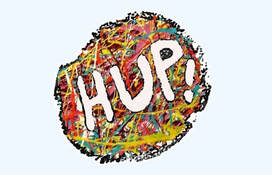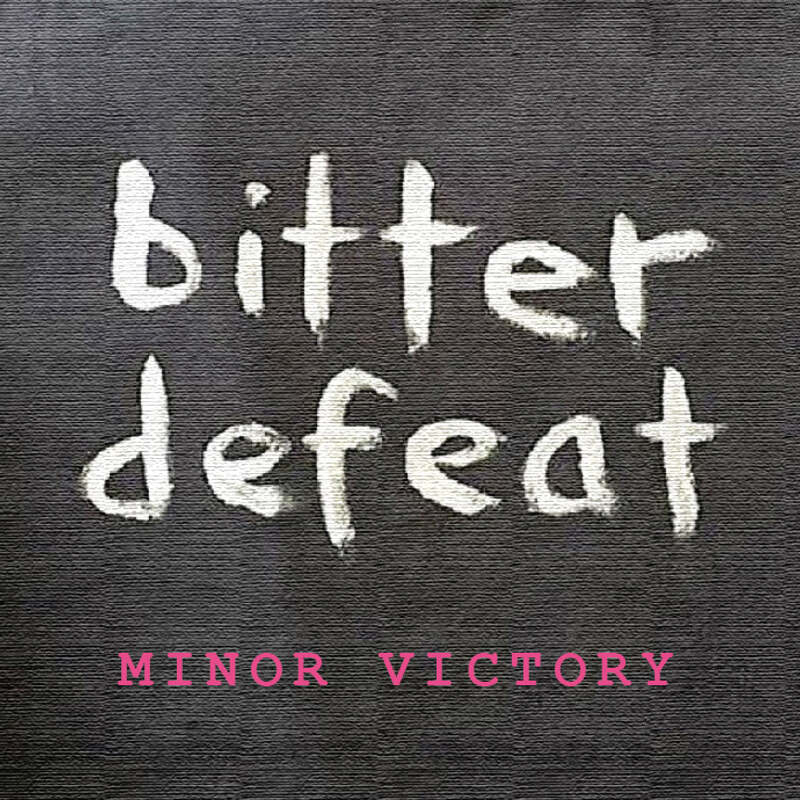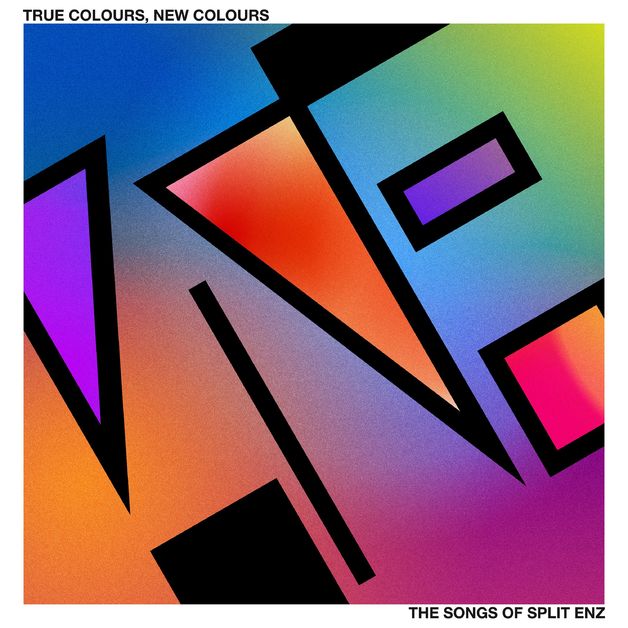|
R E V I E W Minor Victory EP, by Bitter Defeat Reviewed by Max Johns Judged by appearances, Bitter Defeat are a bunch of happily scrappy part-timers who just get a kick out of making music together. They wear their ‘90s indie-rock influences on their sleeve, joke around at gigs, and don’t strive to break any inventive artistic ground. Sure, some of them have been in bands before but now they’re messing around on (mostly) unfamiliar instruments. It’s all just a bit of fun that sprang unexpectedly from Rob bashing on a guitar in his spare room. And yet, whenever a notable indie rock act comes through town - The Bats, Hamish Kilgour, even John Davis of Folk Implosion - you can bet that Bitter Defeat will be on the bill, holding the local torch and taking up their fair share of the merch table (even before they had a CD to sell). They’ve charted on Radio One in Dunedin and started building a social media audience that reaches around the world. Before this EP came out they’d already shot two videos. Onstage they shrug off bum notes and gear failures. Online they shoulder the promotional side of bandlife more like pros. In the rehearsal room they seek out the footsteps of national treasures. Take the Clean’s landmark Tally Ho. It’s an exalted, near-legendary track in the realms of DIY pop-rock. Sure, it’s littered with imperfections and the lyrics are a last-minute mess, but it put a spark under countless bands around the world. Flying Nun’s own tribute album, God Save the Clean, attracted 21 contributors from Guided By Voices to Salmonella Dub. None of them dared touch Tally Ho. Bitter Defeat, conversely, have added it to their live repertoire. They’re a slacker band with a professor on keys and a surgeon on bass. The band of an "aw, shucks" songwriter who’s spent 15+ years playing in the local scene. (Oh, and he founded both Gravel Streak Records and Hamilton Underground Press too.) In a pleasant echo of the Flight of the Conchord’s old boast (“New Zealand’s fourth-most-popular folk duo”), Bitter Defeat are the leading indie rock band in New Zealand’s fourth-largest city. Their debut EP, ‘Minor Victory’, was released on CD and a bunch of streaming platforms (like Bandcamp) this month. Over five tracks and 13 minutes it captures Bitter Defeat as a clever group of friends bashing out four-chord pop-rock and subtly tucking away some high-quality work for careful listeners to enjoy. It’s short, it’s fun, and it stands up to being put on repeat. There are limitations on display, of course. Most of them the band would readily admit to, and some of them are probably designed in. Listeners won't be shocked to learn that Rob Shirlow’s not really been a singer before. I can't assure you that Ian Duggan ever gets both hands on the Casiotone at once. The rhythm section gets the job done without setting the world on fire. There are no screaming guitar solos, virtuoso flourishes or musical acrobatics. The songs are about ex-girlfriends (Better), about weird eyelashes (Long Lash), and about wanting to screw (All the Things). Rob’s not exactly operatic in his singing which makes it easy to yell along with this stuff - so easy that you might miss the drama behind the comedy. Long Lash ends on the dread of “my limited days” and All the Things shifts gear from straight-out lust to long-lived regret. Opening track Light That Shines sounds like a party but describes a grandmother’s life fading away in the sun. Thematically things mostly lighten up after that (although the final line of the EP is “won’t you just hurry up and die”, followed by a little yelp). Structurally, the songs can deceive in the same way the lyrics do. You’d have every reason to expect Bitter Defeat’s songwriting to follow the tried and true verse-chorus-verse pattern. Any more than that might betray the aesthetic. But there’s a bit of hidden art here. Choruses are rare, and despite being short most tracks pack the vocals in early and find a few corners to wander around on their way out. Light That Shines, that upbeat reflection on death and family, sticks to the pop-rock formula most closely. It contains the only repeated chorus (and, in that, the best use of backing vocals) and a catchy, ringing hook that belies the subject matter. If anything on this EP somehow becomes an unlikely breakout hit, this will be it. Clocking in at an extravagant 3:11, Long Lash brings Ben’s lead guitar to the fore. No other track owes as much to the classic indie era of the 1990s. Over the dashed-off chord progressions the guitar lines play nicely without sitting back. In between verses they’re the main event. The song evolves to finish with a shoegazey moment that’s over too soon. The band could afford to spend longer with pedals near full bore and microphones switched off. After two verses of enjoyable vitriol directed at an ex, Better segues into a bridge that appears to be a fade-out singalong (at which point listeners of a certain age might detect a hint of Blur “in the house on the hill, in the house on the hill, in the house on the hill”). Only this false ending actually kicks in before the halfway mark, and leads into what might be the EP’s tightest instrumental work. Julian White’s bass rumbles like nowhere else. The lead/rhythm relationship softens between the two guitars, which step forward together. Kathryn Thompson gives the snare its hardest thumping, and when all’s done the Casiotone hangs on past the end, bringing out just a little taste of that Dunedin-style jangle. A song of three thirds, then, but fewer minutes. All the Things bowls a different sort of googly, with two guitar solos packed into its 131 seconds. Lead guitarist Ben plays a counter-melody throughout, one of the better uses of his skills and position in the lineup.
Streetlight is another sub-3 minute track that gets the singing (and a bit of half-growling) done in time for the band to take the last minute for themselves. Ian’s Casiotone arpeggios hold the song in place as guitars slide around and the EP comes in to land we hear Kathryn sum up, in perfect Bitter Defeat terms, the scale of their achievement: “Didn’t cock up!!” Not only have they not cocked up, Bitter Defeat have produced an EP that sits comfortably within the company they would hope, in their self-effacing way, to keep. Hamilton’s long if unsteady line of guitar-driven groups has a clear leader today and this recording proves their pedigree. It might even do a bit more than that. Should there ever be time for a full album we can hope to hear even more experimentation with simple-seeming songs, more sly lyricism, and maybe even that Tally Ho cover.
3 Comments
R E V I E W ‘True Colours – New Colours’: Split Enz tribute album By Ian Duggan Like many New Zealand music lovers, I went through a Split Enz phase in my younger years. I bought all the albums, including multiple variants of some. My primary love though was for their early work; songs contained on the first few singles, like ‘For You’, ‘Split Ends’ and ‘129’, and the albums ‘Mental Notes’ (1975), ‘Second Thoughts’ (1976) and ‘Dizrythmia’ (1977). The wheels were falling off for me by the time they got to 1979s ‘Frenzy’, though the band were still able to release some fantastic singles over the following years. If you are familiar with the history of the Enz, it will be clear that the music I best appreciated was that from the Phil Judd-era, and I much preferred what he did as a solo artist on his ‘Private Lives’ album, with The Swingers and then Schnell Fenster than much of what Split Enz released following his departure (or, for that matter, Tim Finn’s solo work, or Crowded House). True Colours was released in 1980 and represented the band’s first major commercial success, reaching #1 in Australia and New Zealand, #10 in Canada, #38 in the UK and #40 in the USA, particularly on the back of the Neil Finn penned single, ‘I Got You’. This album led to a change in their fanbase – some older fans continued to support the band in its new overtly poppy direction, while others were lost – though the new approach clearly attracted a slew of new followers. Personally, I find the original True Colours album to be patchy; it does have some superb pop songs, in particular the singles ‘I Hope I Never’ and ‘Poor Boy’. Nevertheless, it also features ‘I Got You’, their massive hit, which for me has not aged well. Further, songs like ‘What's the Matter with You’, ‘I Wouldn't Dream of It’, ‘Missing Person’ and ‘How Can I Resist Her’ have always felt like fillers, making up the numbers, and also a bit cringey. Nevertheless, there were some pleasant surprises on the original album, particularly ‘The Choral Sea’ - an instrumental written by the whole band, which provided a strong finish to the LP. Forty-one years after the original, a tribute album, ‘True Colours – New Colours’, has been released, featuring covers of all the songs from the album, in their original order, by a variety of New Zealand and Australian artists. For me, however, this album was on a hiding to nothing before it even started. As mentioned, many of the songs on the original album just aren’t that strong, and as such they would need to get some special treatment to be salvaged by the artists interpreting them. Starting with the positives, however, is that all the artists attempted to make the songs their own, rather than simply emulating the originals. This is true for the opening track, ‘Shark Attack’, covered by Chelsea Jade. For me, this dream-pop version is one of the highlights of the album – it isn’t frenetic like the original, or as the lyrical content might suggest it should be. Some might see this as a down point, but I disagree; I want a different interpretation, and this one is successful in giving it to me. The Beth’s sped-up, poppy take on ‘What's The Matter With You’ is pretty good also, for the most part, with Elizabeth Stokes’ vocal delivery more appealing to me than Tim Finn’s on this song. At the other extreme, the strongest tracks on the original album come in for the harshest of treatment. Bernard Fanning’s (Powderfinger) take on ‘I Hope I Never’ I find unlistenable, and Stan Walker’s dubby/BBQ reggae version of ‘Poor Boy’ reminds me of much of what I find wrong with New Zealand’s most popular music artists currently. ‘The Choral Sea’, also one of my favourites on the original album, is made unrecognisable by Pacific Heights, while Shihad’s take on ‘I Got You’, like the original, just doesn’t work for me here either. Tribute albums are always patchy, and this one is no exception. Overall, this one just doesn’t really work for me. Some of this is obviously the result of uninspired song interpretation, which is unfortunate, but the quality of some of the source material here was probably never going to make this a winner. |
Archives
July 2022
Categories |



 RSS Feed
RSS Feed
